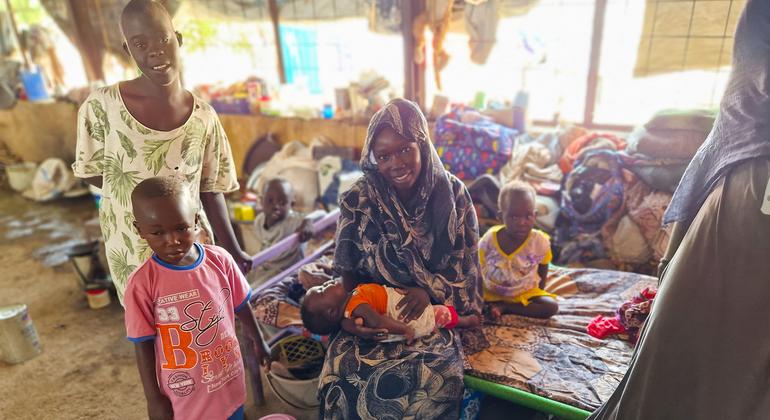Emergency response rooms are finding innovative approaches to providing rapid assistance to millions facing war in Sudan.
Teams of volunteer medical staff, engineers and other emergency experts across the country are addressing civilian needs amid the current bout of violence and insecurity stemming from clashes with rival military forces in April 2023.
So far, ERRs have reached more than four million civilians, bucking bureaucracy and finding innovative solutions.
UN News met with three young volunteers who visited UN Headquarters in New York to attend meetings with officials and actors in the humanitarian field.
The goal is simple: reach those facing the risk of death, famine, disease and difficulty obtaining drinking water, electricity and communication services.
Needs are great
Needs are great, they said. The ongoing conflict has led to the departure of humanitarian agencies, collapse of state institutions and interruption of basic services in large parts of the country amid soaring civilian casualties and large-scale displacement.
More than 7.4 million people have been forced to leave their homes in search of safety within and outside Sudan.
Operating in states across the country, ERRs function like a “local emergency government”.

Youth-led emergency response rooms expanded after the outbreak of war in Sudan to fill the vacuum created by the departure of international humanitarian organizations.
‘Filling a vacuum’
After the outbreak of war, Hanin Ahmed, a young Sudanese activist with a master’s degree in gender and specializing in peace and conflict, founded an emergency room in the Omdurman area with one of her colleagues.
She and her colleagues visited UN Headquarters to, among other things, shed light on the Sudan issue, which she said does not receive enough attention despite the catastrophic deterioration of the situation on the ground.
“We are united by humanitarian work and the sense of responding to the repercussions of war and helping people,” she told UN News.
The emergency rooms contribute to filling part of the vacuum left behind when international humanitarian organizations left, Ms. Ahmed explained.
Each initiative enjoys intense community participation by young people of all political orientations, she said, highlighting some of their success stories, from assisting victims of sexual violence to providing pathways to safety.
“Through our youth networks and our personal relationships, we were able to open safe corridors to evacuate citizens from neighbourhoods under attack and take them to shelter centres,” Ms. Ahmed said.
“We are proud of that.”
“But, we face theft and are exposed,” she said. “Young people are targeted, arrested and killed while they work in very difficult conditions.”
A simple, practical structure ‘away from bureaucracy’
The initiative began using large youth networks built in the wake of the December Revolution in 2018 in response to the COVID-19 pandemic, said Muhammad Al-Ebaid, head of the reporting committee in the Khartoum state.

Youth-led emergency responders are helping communities in the face of war.
The efforts expanded after the war broke out in April.
“We tried to find a simple and practical structure to carry out tasks, away from bureaucracy,” he said. “So far, we have been able to provide food, electricity, water and protection services to nearly four million people in Darfur and Khartoum.”
Where there is a need, ERRs take action. Unstable electricity services are addressed by volunteers carrying out maintenance operations.
Amid spreading violence, emergency rooms have so far been able to evacuate about 12,000 people, including more than 800 from the Al-Fitaihab area in Omdurman in December, Mr. Al-Ebaid said.

Children and women queue to collect clean and safe water in Zalingei town in central Darfur.
‘An emergency local government’
Darfur emergency rooms coordinator AbuZar Othman said these initiatives amount to “a local emergency government” that seeks to provide continuous humanitarian services managed by Sudanese men and women “in order to build solidarity that preserves our social fabric and dignity and covers our needs”.

Hanin Ahmed (left) and Muhammad Al-Ebaid work in emergency response rooms in Sudan.
Pointing to the enormous suffering that people in Darfur have been experiencing due to the armed conflicts since 2003 through the current war, he said violations against civilians “have risen to being described as crimes of genocide and ethnic cleansing, leaving behind an extremely complex humanitarian, economic and social reality”.
At a time when the war is expanding alongside intertwined challenges, he said establishing emergency rooms in four states is a decisive step towards providing the necessary support and rapid response to citizens’ needs.
From the spread of weapons to ethnic tensions, Mr. Othman said the challenges are broad, including addressing the ongoing agricultural and grazing sector crises, interruptions of communications networks and a lack of health services.
Finding innovative solutions
At UN Headquarters, the three volunteers called on the international community to recognize emergency rooms as an actor in the humanitarian field and provide support to them.
“We are trying to adapt to all the challenges that exist and find innovative solutions to them, but we still need development, and we need a strong system that is compatible with all these challenges,” Ms. Ahmed said.
“We in emergency rooms cannot cover all the needs in conflict areas, therefore, we ask the international community and international organizations to shed light on the Sudanese issue and to put pressure to silence the sound of guns, protect civilians and provide more support to help those affected by the war.”
Fast facts
What are emergency response rooms (ERRs)?
- Informal community-led initiatives in Sudan
- Driven by local actors, including growing numbers of youth
- Mobilized during the COVID-19 pandemic
- Expanded following the outbreak of war in 2023
- Rapid responders to urgent needs
- Providers of essential humanitarian services to affected populations





